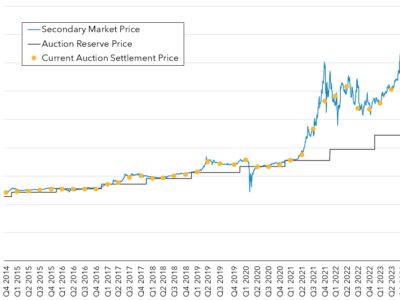The Possible Merits of a Hybrid Sales+Carbon Tax
There’s been a lot of discussion of carbon taxes, which economists virtually all love. Proposed carbon taxes would generally be imposed at the level of fossil-fuel sellers or importers, or when producers use carbon. Imposing the carbon tax on consumers would have some significant advantages. This could be done with some fancy VAT-type mechanism, but a garden-variety retail sales tax would also work. The only novelty would be in calculating the amount of the sales tax, which would be tied to a product’s “embedded carbon.” Also, unlike other sales taxes, the tax would only be imposed on sales to consumers, not on sales to companies. Read past the jump for more about the practical issues and potential advantages of such a hybrid tax.
The tax would be collected at the level of retail sales, exactly like a sales tax except that the amount would be measured by the amount of carbon connected with a product over the product’s lifestyle. To limit potentially drastic economic effects, the amount could be capped at a percentage of the sales price.
Doing a full life-cycle analysis for a broad range of goods would be very difficult, but it would be easier to do this for energy sold to consumers, either in the form of electricity or of vehicle fuels. California is essentially engaging in such an analysis under AB 32 for regulatory purposes, so the groundwork has been laid for a tax. Moreover, it would be relatively easy for energy producers to track carbon content up through the retail sale, compared with the problem facing retailers that sell a broad spectrum of products.
The biggest problem with this idea is political: voters don’t like taxes, and sales taxes are especially easy for them to notice and dislike. But this visibility could also be a practical advantage, because it would help people focus on the climate impacts of their consumption decisions. There’s also a policy problem because energy taxes are regressive, but economists have a number of techniques for countering that effect (and any method of restricting carbon emissions raises similar problems anyway).
On the positive side, a hybrid tax would be easy to collect. Since it’s a form of sales tax on in-state retail sales, it should face few legal challenges. (If there’s a percentage cap, it could actually be considered a normal sales tax with a non-discriminatory deduction for low carbon intensity, which should be constitutionally bullet-proof). For this reason, a hybrid scheme actually might involve fewer legal issues than a state cap-and-trade scheme. On a technical level, the sales tax also avoids a constitutional problem with state VAT taxes, because states can’t use border measures that countries use to fit exports and imports into a VAT. Unlike a carbon tax on producers, a hybrid tax would not affect exported goods, which helps deal with the problem of carbon leakage. Like any carbon tax, the hybrid tax gives producers an incentive to reduce their use of energy derived from fossil fuels. And like any carbon tax, it would allow the government to reduce other taxes (some of them even more regressive), shrink government deficits, or fund important programs.
Of course, this tax wouldn’t be a full solution to the problem since it could probably cover only energy sold directly to consumers. But it would be a big step in the right direction, if we could only get over the political hurdle.








Reader Comments